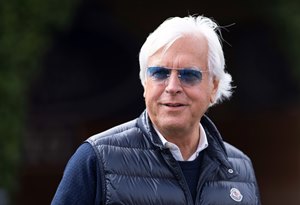KHRC Denies Stay of Baffert, Medina Spirit Rulings


Hall of Fame trainer Bob Baffert has been denied a stay by the Kentucky Horse Racing Commission on the 90-day suspension he was handed by stewards Feb. 21, the KHRC confirmed Feb. 25. A stay of a separate decision to disqualify the late Baffert trainee Medina Spirit from his win in the 2021 Kentucky Derby Presented by Woodford Reserve (G1) was also denied Friday.
Requesting a stay was the next step for Baffert's attorneys in a lengthy legal process that began when a post-race test (and split sample) after the Kentucky Derby indicated the presence of the corticosteroid betamethasone—prohibited at any level on race day in the state of Kentucky—in Medina Spirit's system. More than nine months after the race, Baffert was suspended and fined $7,500. The suspension is to span March 8-June 5, and would be reciprocated in U.S. racing jurisdictions.
In Kentucky, betamethasone is a penalty Class C substance, a level considered to have "a lesser potential to influence performance" compared with the performance-enhancing effects of drugs in Class A or B. The penalties assigned by the stewards are in line with Kentucky's recommended sanctions for such a finding.
Those recommendations call for the horse owner to be penalized through a disqualification of the horse and loss of purse money. As for the sanctions of Baffert, they are in line with a Class C finding but appear to have included the trainer's four failed drug tests in the 12 months leading up to the Derby as mitigating circumstances. Penalties recommended for Class C for three or more offenses call for a suspension of 30-60 days and a $2,500-$5,000 fine absent mitigating circumstances.
A letter addressed to Baffert's lead attorneys, Craig Robertson and Clark Brewster, was released Friday detailing the denial from KHRC executive director Marc Guilfoil.
"I do not find good cause to grant a stay ... Consequently, the requests for stays of these stewards' rulings are denied," wrote Guilfoil, who went on to mention Baffert's right to petition for review of the decision.
Robertson did not return calls from BloodHorse seeking comment, but earlier Friday Robertson told Daily Racing Form reporter Matt Hegarty that Baffert's legal team would, of course, appeal the decision and file a motion in civil court if necessary.
"We will do whatever is necessary to get a stay enforced prior to March 8," Robertson told DRF.
The first stop in an appeal would be at the regulatory level—to the full KHRC. Usually under such an appeal, the KHRC will bring in a hearing officer who will consider evidence and testimony before making a recommendation to the KHRC. The commission typically follows that recommendation, although it's not required.
Parties also have the right to appeal regulatory decisions in court. Legal appeals of KHRC decisions typically begin in Franklin (Ky.) Circuit Court.
It is the second time in history a horse has been disqualified from victory in the Kentucky Derby for a failed post-race drug test. In 1968 Dancer's Image was disqualified after testing positive for phenylbutazone, or "bute." That decision ultimately held up after years of litigation, making Forward Pass the winner.
Baffert's attorneys have argued in court that Medina Spirit's test results indicating betamethasone were linked to the colt receiving treatment with the anti-fungal ointment Otomax for a skin issue on his hindquarters. They have since said that testing at a New York laboratory backs up their theory that the failed post-race test was caused by the ointment, rather than an injection.
In a Dec. 3 release about the testing by Dr. George Maylin at the New York Equine Drug Testing and Research Laboratory, Baffert's attorney Robertson not only said that the results point to the ointment as being the source, but added that Kentucky rules do not apply to the type of betamethasone from the ointment. The stewards' decision Monday made no differentiation.
Medina Spirit died suddenly Dec. 6 after a workout at Santa Anita Park.
